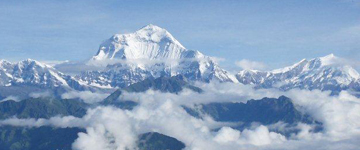| |
|
|

Interviews ::
 |
Amy Wu, an award-winning writer for the women’s Ag and Agtech movement |
 |
Ms. Irene Karani, Children’s Investment Fund Foundations’ Africa Climate Director |
 |
Natalia Schäfer (Schaefer), Leading and Globally Renowned Artist |
|
Read All Interviews |
News / Updates/ Analysis ::
COP 27- some hopes midst of chaos
Climate Change is Happening Now- Time to Take Action!
|


|
|
|

|
If you value water, your life depends on healthy and resilient mountains.
Brian Peniston, Nepal and India Country Director- The Mountain Institute
Debate on Asian Mountains and Climate Change
|
Brian Peniston is the Nepal and India Country Director for the Mountain Institute. He has worked on international conservation and development projects since 1975, and has overseas work experience in Nepal, Indonesia, Malaysia, Thailand, Cambodia, and Peru. Mr. Peniston has also helped design integrated conservation and development projects in Bhutan, Papua New Guinea, Vietnam, Tibet, and Central Asia. Mr. Peniston spoke to Earth Concern Asia Team regarding the importance of the Mountains midst of the climate change debate. Following is the summary of the discussion.
- What are the major current challenges that Asian Mountains are facing?
One of the major challenges is regional peace and political stability. Without this, it is difficult to do much else. A second important challenge is the impact of changing climates on mountains and mountain ecosystems, including extreme weather events. As you are aware temperatures are increasing and increasing 6-8 times faster in mountains. With increased temperatures, there are increased extremes in weather events, especially extreme rains, extreme droughts, and extreme precipitation events such as snowfall. This all affects the predictability of hydrology including water flows for hydropower, irrigations and drinking water. These combined changes and the rates of change severely impact the many mountain communities that depend on rainfed agriculture which then in turn affects food production and availability.
- Generally, ethnic groups and minorities are the one to live in mountains and to protect them, what is the general situation of these people facing their livelihood challenges? Especially how is the situation of local people in your working areas of Nepal and China?
Typically mountain communities (whether ethnic minorities or not) are sidelined out of the mainstream -politically and economically. Less well known but equally important, mountain communities are home to a disproportionate number of global conflicts. These characteristics along with marginalization, lack of access to goods and services, lack of access, limited employment opportunities, and high out migration to markets combine together to make creating mountain livelihoods especially challenging.
- Asian cultures have strong bonds with Mountains- how do you see the future of these cultures?
While there are many challenges unique to mountain ecosystems and environments, mountain people tend to be hardy, resilient and used to being self reliant. The challenge is to identify these positive characteristics and used them as the foundation to build new responses. Cultures are also not static and ever changing, so I think that mountain people can rise to and face these emerging challenges when given opportunities.
- The development focus of the government is less in Mountain areas and its people, do you agree with this statement in the context of your working areas?
Mountains are often remote and difficult to gain access to. They are often home to small populations of marginalized people with limited political voice or power. This makes service delivery costly in terms of both time and money. It means that it is easier for governments to ignore or under emphasize these types of development challenges and hence we need to work harder to ensure that the issues of mountains and mountain people are not ignored. Constant outreach and awareness raising are needed.
- People have a tendency to take Mountains as taken for granted, what do you think ways to sensitize people to protect mountains, culture and people?
While some people take mountains for granted, others are very passionate and committed to mountains and find inspiration in the physical, cultural and spiritual aspects of mountains. There is no one single way to continue to keep mountain issues on the agenda, and therefore a constant effort to keep mountains in the news and media, on TV, in debates, in development discussions, etc is required. It is also important to develop awareness materials that highlight the importance of mountains to the next generation so that they can carry the "torch" into the future, much in the same way that many others have raised the profile of the rain-forests and ocean ecosystems. This will require a concerted, multi-year and multi-pronged effort using all the tools that we have including social media, scientific literature, popular culture (TV, internet, music and film, etc).
- Especially in the context of Nepal and China (your working areas) how do you see the conditions of women and children, what are their major issues?
Many of the issues I have mentioned are not gender specific and affect men and women both. Peace is the most important criteria to move forward regardless of gender. Lack of opportunities again is not gender specific but often the burden seems to fall on women, children and the aged especially in areas where there is significant out migration, and these are often the only people remaining in these communities.
As many mountain communities are highly dependent on natural resources, women often become the de facto stewards and managers of these resources, and special efforts are required to ensure that women have the necessary skills and training. This is also true in the economic and political spheres, so efforts to develop special training packages and special means of empowerment are often required.
- What is your message?
Mountains sustain life on earth. Protect mountains and mountain people. If you value water, your life depends on healthy and resilient mountains.
Date: Feb 16th, 2011.
For your feedback: secretariat@earthconcernasia.com
Note: Opinions expressed in interview sections and individual write ups are of interviewee/ authors; earth concern facilitates to bring ideas and perspectives.
|
|

